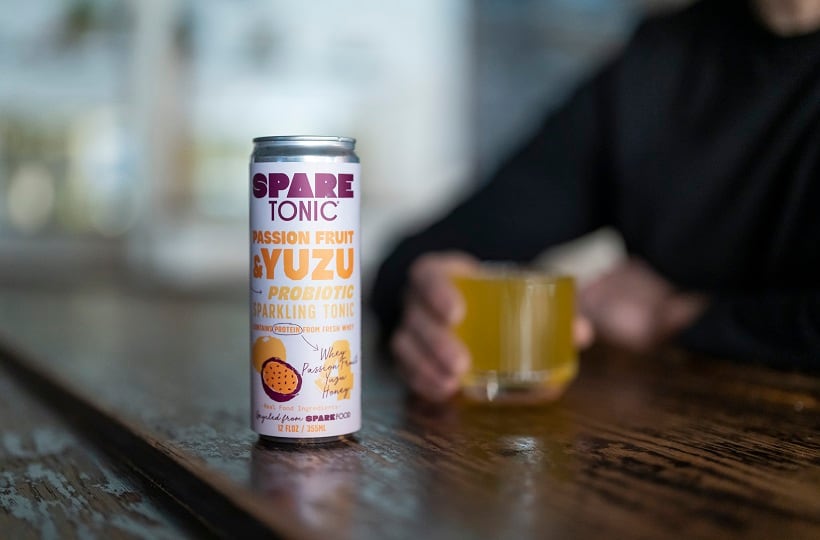The new Passion Fruit & Yuzu sparkling tonic will roll out regionally on the East Coast at the end of March and contain four ingredients: honey, fruit, spice, and whey. The beverage joins the brand’s existing portfolio, which includes Blueberry & Ginger, Cucumber & Lime, and Lemon & Ginger. These beverages will also be featured at the Upcycled Food Association booth #5194 during Natural Products Expo West this week.
Using whey in a different way
While co-founders Jeremy Kaye and his brother, chef Adam Kaye, come from four generations of food entrepreneurs, the two didn’t initially set out to create the next probiotic beverage, Jeremy Kaye told FoodNavigator-USA. “It's not like we went out and tried to say, ‘Alright, we want to make this great new probiotic drink that's full of electrolytes and proteins and probiotics and everything else. How are we going to do it,’” he added.
Instead, Jeremy Kaye, previously working for brands like Nike and Patagonia, partnered with his brother, chef Adam Kaye to launch the brand and found an opportunity to use whey that was normally discarded in the Greek-style yogurt process.
Having worked as a chef at Blue Hill at Stone Barns in New York, Adam Kaye not only “understands flavor and cooking and technique,” in his practice as a chef, he also tried to use every part of the plant or animal. “[Adam] would use on the pig everything but the squeal,” Jeremy Kaye added.
More specific to The Spare Food Co., Adam Kaye also had experience using both overlooked ingredients in his cooking and whey specifically, Jeremy Kaye explained. In 2015, Adam Kaye worked on a food restaurant concept pop-up called wastED, where he worked with local suppliers and farmers to source their unused ingredients.
And when it came to whey, “Adam had been working with whey in the kitchen for the better part of seven or eight years, putting it into desserts, and making condiments, and tenderizing meat, and using it in so many different ways,” Kaye said.
Upcycling: More than a trend
While more consumers today are looking for sustainable food and beverage products, The Spare Food Co. doesn't see upcycled being a trend, instead as part of a larger food movement, Kaye said. "If we're going to feed 10 billion people by 2050, we certainly, need to think differently about our food system," he said said. One way to do that is by looking at the food currently available and identifying what is being underutilized, he added.
"We talk about overlooked and unused ingredients; we do not talk about waste at The Spare Food Company. And if we do, it's wasted food not food waste ... Very intentionally, you switch those two words, [and] the emphasis is on food.”
Addressing food waste in New York and abroad
"Wasted food" is a major contributor to local and global environmental issues, Kaye explained.
The Spare Food Co. sources its whey protein from New York Greek-style yogurt manufacturers, where “70% of Greek-style yogurt … that is consumed in the United States is produced,” Kaye said. In their manufacturing process, Greek-style yogurt producers are “straining out those other two to three cups of whey” to create a single cup of yogurts, which is creating an “excess of a billion pounds” of whey going unused, or worse, dumped back into the environment, Kaye added.
“If you're going to eat that one cup of yogurt, what's happening to those other three cups of liquid that were the milk? And if you go further upstream - and we know that it takes four and a half gallons of water to make one gallon of milk - you can start to see that there is a real opportunity here not just a business opportunity but a human and societal [and] a personal opportunity to think differently about our food system.”
Looking globally, wasted food has also become a major contributor to climate change, Kaye pointed out.
“We know the science is out there; 200-plus studies that show that preventing food waste is the number one way we can actually reverse the effects of climate change.”


